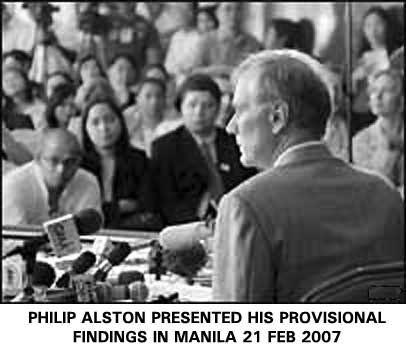
“A significant number of the hundreds of extrajudicial executions of leftist activists in the Philippines that have taken place over the past six years are the result of deliberate targeting by the military as part of counterinsurgency operations against the communist rebels”, according to a report released today by the UN’s Special Rapporteur on extrajudicial executions, Philip Alston.
Alston investigated the executions in depth, interviewing victims or witnesses to 57 incidents involving 96 extrajudicial executions, meeting with Government officials ranging from local military commanders to the President, and speaking with the leadership of the communist rebels’ National Democratic Front (NDF).
The Communist Party of the Philippines (CPP) has sought to revolutionize what it characterizes as the Philippines’ “semi-feudal” society since 1968. The CPP controls an armed group, the New People’s Army (NPA), and a civil society group, the NDF.
Alston concluded, “In some parts of the country, the armed forces have followed a deliberate strategy of systematically hunting down the leaders of leftist organizations. As commander-in-chief, the President must take concrete steps to end such operations.”
He also noted that the military officers with whom he spoke “relentlessly pushed” the theory that these extrajudicial executions had actually been committed by the rebels in an internal “purge” designed to simultaneously eliminate spies and discredit the Government. Alston reviewed all of the documentation provided in support of this contention.
“The military’s argument that the leftist activists who have been killed are the victims of a ‘purge’ by the rebels is strikingly unconvincing and can only be viewed as a cynical attempt to displace responsibility,” he concluded. While he was encouraged by various measures adopted recently by the Government and by the fact that the Executive Secretary of the Philippines had recently met with him in New York, Alston observed that only concrete results in terms of eliminating killings, and prosecuting and punishing those responsible could make a real difference. “The government has undertaken a range of welcome reforms, but the fact remains that not a single soldier has been convicted in any of the cases involving leftist activists,” Alston said.
Killings by the communist rebels
Alston noted that while there was no evidence that the communist rebels were currently involved in an internal purge, they were responsible for some extrajudicial executions.
He criticized the rebels’ killing of civilians not directly participating in hostilities, the death threats they direct against political opponents, and their system of “people’s courts” and “revolutionary justice”.
“The death sentences imposed by their ‘people’s courts’ provide only a veneer of legality for what is really vigilantism or murder,” Alston said.
Killings related to the conflicts in Western Mindanao
During his mission, Alston also interviewed a number of witnesses concerning extrajudicial executions in western Mindanao and the Sulu archipelago. These are areas in which there is armed conflict involving a number of insurgent and terrorist groups. Most notably, the Government confronts the Moro National Liberation Front, the Moro Islamic Liberation Front, and the Abu Sayyaf Group.
Alston noted that witnesses in these areas live in enormous fear and that responsibility for abuses is often difficult to determine. He concluded that greatly improved human rights monitoring was needed to protect the civilian population in these areas.
Death squad killings of street children and petty criminals in Davao City
During his mission, Alston investigated the actions of a death squad operating in Davao City. He interviewed victims and witnesses, spoke with local police and military officers, and met with the mayor. He concluded, “The mayor’s position that he can do nothing to stop men without masks from routinely killing children for petty crimes in full view of witnesses lacks all credibility. Mayor Duterte should be stripped of his control over the local police, and the national government should assume responsibility for dismantling the death squad and prosecuting its members.”
Alston’s report also examines a number of other issues, including killings related to agrarian reform disputes, killings of journalists, and the deficiencies of the criminal justice system.
— UNITED NATIONS Press Release 26 Nov. 2007 downloaded at http://www.unhchr.ch/
See also:
 Home | Aims and Objectives of Solidarity Philippines Australia Network | About Kasama
Home | Aims and Objectives of Solidarity Philippines Australia Network | About Kasama 
Search the SPAN Web